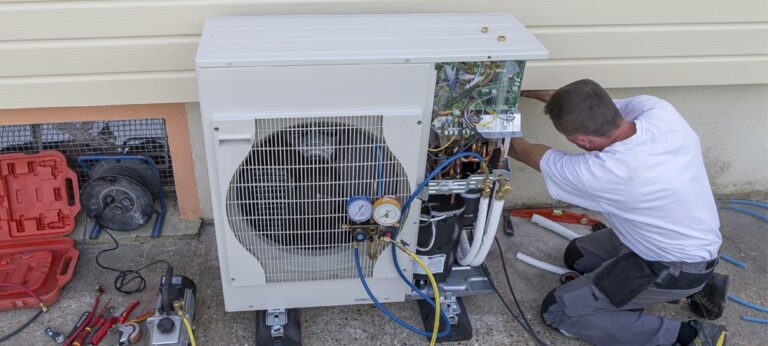Key Takeaways:
- Regular air conditioning system maintenance can extend its lifespan and improve efficiency.
- Simple steps like cleaning filters and clearing debris can significantly impact performance.
- Professional tune-ups are crucial to catching potential issues early and ensuring smooth operation.
- Understanding common problems and their symptoms can help prevent severe damage and costly repairs.
Introduction to Air Conditioning Maintenance
An efficient air conditioning system can be a lifesaver during hot summer months, but it requires regular maintenance to continue performing optimally. Simple, routine checks can prevent unexpected breakdowns and extend the life of your unit. From changing air filters to scheduling regular air conditioning repair services, these maintenance tips can help keep your air conditioner running smoothly. Regular upkeep saves you from unforeseen inconveniences and contributes to energy savings, making your home more eco-friendly.
Homeowners can ensure their air conditioning system is dependable during peak periods by following a maintenance regimen. No matter how minor, each maintenance step accumulates to significantly improve the system’s performance and longevity. More importantly, addressing potential problems early can prevent them from escalating into costly repairs or replacements.
Cleaning and Replacing Filters
Cleaning or replacing the air filter is one of the easiest yet most frequently disregarded maintenance tasks. A clean filter improves air quality and ensures the system runs efficiently. Depending on the type of filter and usage, you may need to clean or replace it every 1-3 months. According to Energy.gov, dirty filters can reduce airflow and increase energy consumption by 5% to 15%. This seemingly simple task can significantly improve your system’s performance.
It’s also essential to know the type of filter your system uses. While standard fiberglass filters are cheaper and need frequent replacements, pleated filters last longer and capture more dust and debris. HEPA filters, although pricier, offer the best filtration, beneficial for those with allergies or respiratory issues. Keeping these filters clean ensures that your air conditioner doesn’t have to work as hard, prolonging its life and efficiency.
Clearing Debris from the Outdoor Unit
Debris, such as grass clippings, dirt, and leaves, can build up around your air conditioner’s outdoor unit. Keeping this device clean ensures the best airflow. Just shut off the electricity and carefully use a garden hose to remove any leftover material. The fragile fins of the unit may be damaged if high-pressure water is used. Regularly checking and cleaning the unit will prevent buildup obstructing the system’s capacity to dissipate heat, leading to better performance and energy efficiency.
Furthermore, ensure that the area around the outdoor unit is free from plants or obstructions. Maintaining a clearance of at least two feet around the unit allows for adequate ventilation. Trimming plants and moving objects that block the airflow can prevent overworking the compressor, which is crucial for the unit’s longevity.
Regular Professional Tune-Ups
While homeowners can perform some maintenance tasks, others require professional expertise. Regular tune-ups by a professional can help catch potential issues before they become major problems. Technicians can check coolant levels, inspect the wiring, and calibrate the thermostat during a service visit. Consumer Reports recommends annual professional maintenance to ensure your system operates efficiently throughout the year.
During a professional tune-up, technicians also clean coils, evaluate ductwork for leaks, and test the system’s safety controls. These inspections and adjustments ensure that your air conditioner functions at its peak, offering better comfort and reduced energy costs. Additionally, professionals can provide insights into whether to upgrade your system or make adjustments for better performance.
Inspecting and Clearing the Condensate Drain
The condensate drain line can become clogged with dust and algae, leading to water damage and increased humidity in your home. Regularly inspecting and clearing this drain line can prevent such issues. Most air conditioning systems have a visible drain line that can easily be accessed and cleaned with bleach and water.
A clogged condensate drain can also cause your system to shut down unexpectedly. Regularly checking and maintaining this component can avoid water damage to your home’s foundations and maintain comfortable indoor humidity levels. A wet/dry vacuum is useful in your maintenance arsenal if you want to remove tough blockages.
Monitoring System Performance
Pay attention to how your air conditioning system operates. Unusual noises, reduced cooling efficiency, or unexpected energy bill increases can show that your system needs maintenance. Addressing these symptoms early can prevent more severe damage and expensive repairs. Record irregularities to discuss with a technician during your next service visit.
Monitoring the system’s performance also includes tracking its energy consumption. Some smart thermostats offer data analytics, allowing you to see patterns and identify spikes in energy usage. Understanding and analyzing these trends can help you adjust settings or schedule maintenance before small issues become significant problems.
Understanding Common Air Conditioning Issues
Familiarize yourself with common air conditioning problems, such as refrigerant leaks, frozen coils, and sensor issues. Understanding the symptoms of these issues can help you address them promptly. For example, ice forming on the outdoor unit could indicate a refrigerant leak or airflow problem.
Common issues also include thermostat malfunctions and drainage problems during humid weather. Recognizing these problems early can prevent the system from breaking down during peak usage times. By knowing the signs, such as unusual hissing sounds for refrigerant leaks or uneven cooling for sensor issues, homeowners can seek professional help before it’s too late.
Optimizing Thermostat Settings
Proper thermostat settings can improve comfort and efficiency. Programs with smart thermostats allow you to create schedules that match your lifestyle, reducing energy consumption when you’re not at home. Additionally, ensuring your thermostat is not exposed to direct sunlight or heat sources can help maintain accurate temperature readings.
Utilize programmable settings to maximize efficiency—set temperatures higher when you are away and cooler when you are home. This simple adjustment can result in significant energy savings. Also, familiarize yourself with eco-mode or savings features in modern thermostats, which optimize temperature settings for reduced energy consumption.
